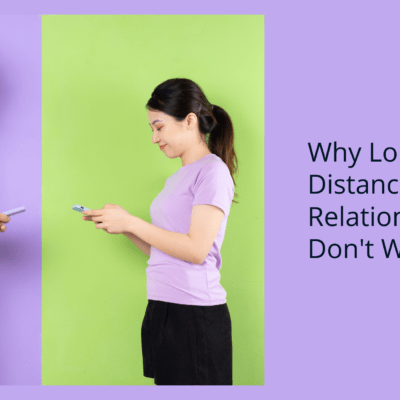Why Long Distance Relationships Don’t Work: Long-distance relationships (LDRs) can be difficult and usually require a great deal of effort and commitment from both partners. While many long-distance relationships can grow, there are different reasons why some may not work out. Here are some of the common aspects that can make long-distance relationships more difficult:
Also Read:
- Long term relationship break up and get back together.
- Reasons Not to Marry a Ukrainian Woman.
- What are good intentions in a relationship?
- Psychology of older woman younger man relationship.
- How to repair marriage after emotional affair?
- Signs that say you have a spiritual connection with someone.
Why Long Distance Relationships Don’t Work
Lack of Physical Proximity
Physical closeness in a relationship qualifies for touch, intimacy, and shared experiences. In a long-distance relationship, these important factors are often limited. The lack of physical presence can lead to feelings of loneliness and emotional force. The incapability to hug your partner when you require comfort or celebrate special moments together in person can be emotionally difficult.
Communication Challenges
Effective communication is a cornerstone of any successful relationship. In a long-distance relationship, the direct mode of communication is usually through texts, calls, or video chats. These methods, while valuable, lack the nuances of face-to-face conversations. Misunderstandings can happen more easily, and handling differences or conflicts can be challenging. Moreover, if partners are in different time zones, finding suitable times to connect can become an hindrance.
Trust Issues
Trust is important in a long-distance relationship. The physical separation can direct to feelings of insecurity and doubts. Questions about whether your partner is faithful, or doubts arising from not knowing what they are doing, can harm trust. Trust issues can become quite problematic if past relationship experiences have left emotional scars.
Different Life Paths
People grow and develop over time. Goals, ambitions, and life priorities can shift. In a long-distance relationship, partners may grow in different directions, following unique life paths. The separation might boost these differences and lead to a growing disconnect as interests and priorities change.
High Expectations
In some long-distance relationships, partners may have high, almost idealized expectations about their future together. When they do reunite, the reality may not align with these expectations, leading to dissatisfaction. Unrealistic or unmet expectations can put stress on the relationship.
Financial and Logistical Challenges
Depending on the distance between partners, maintaining a long-distance relationship can be costly and logistically complex. Frequent travel, time zone adjustments, and possible visa issues can add stress and strain to the relationship. Financial restrictions might limit the ability to meet in person, and the logistics of coordinating visits can be demanding.
Lack of Support from Others
Friends and family might not always understand or support a long-distance relationship. They may express worries about the sustainability of the relationship, which can make you feel isolated. Lack of support from loved ones can create more emotional stress.
Limited Shared Experiences
Shared daily experiences and routines are important in any relationship. They provide a sense of closeness and shared life. In a long-distance relationship, partners might struggle with the absence of these shared moments. The lack of everyday interactions can contribute to emotional detachment and a feeling of growing apart.
Long-Term Uncertainty
Uncertainty about when or how the long-distance aspect of the relationship will end can be a powerful source of stress. Couples need to have open and honest conversations about their future plans, which can sometimes be challenging due to different factors such as career aspirations or immigration issues. The anticipation of when you’ll be together again can be emotionally challenging.
Over-Reliance on Technology
In a long-distance relationship, much of the interaction happens through technology. While technology is a valuable tool, over-reliance on it can sometimes lead to a sense of void. Virtual interaction may not always meet emotional and relational needs, guiding to a longing for physical presence and shared physical experiences.



